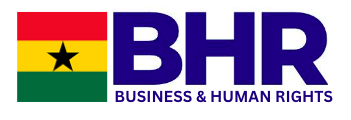AboutBHR
Ghana has an obligation to develop a National Action Plan on Business and Human Rights (NAP on BHR) in order to implement the United Nations Guiding Principles on Business and Human Rights (UNGPs) in Ghana. The UNGPs were unanimously endorsed by the UN Human Rights Council in June 2011 in its Resolution 17/4, supported by Governments from all regions of the world with the aim of advancing the protection, respect and redress of human rights violations by Businesses. The UNGPs are founded on three pillars which are; the State duty to protect human rights, the corporate responsibility to respect human rights and the need for greater access to effective remedy. The Commission on Human Rights and Administrative Justice (CHRAJ) in collaboration with the Ghana Institute of Management and Public Administration (GIMPA), with funding support from the Danish Institute for Human Rights conducted the National Baseline Assessment on business and human rights in Ghana, which was validated at a well-attended national stakeholder validation workshop. Subsequently, the National Baseline Assessment Report was printed in book and braille and was launched with funding support from Oxfam Ghana and an 18 Member National Steering Committee inaugurated on 4th July 2022 to develop a National Action Plan on Business and Human Rights (NAP on BHR) in Ghana. The development of the NAP on BHR is under the co-chairmanship of the Office of the Attorney-General and CHRAJ. The development and subsequent adoption of a NAP on Business and Human Rights will position Ghana as a country that is committed to the promotion and protection of human rights.
Purposeof BHR
- To present to the stakeholders an overview of the Draft NAP on BHR and the Matrix for implementation.
- To obtain inputs of stakeholders into the Draft NAP on BHR.
Backgroundof BHR
Following the inauguration of the Steering Committee to develop a NAP on BHR, a Zero Draft NAP has been developed.
One of the objectives of the UNGPs is to allow individual countries the flexibility to tailor national responses to their domestic business and human rights related deficits. Governments are encouraged to develop national initiatives or frameworks which adopt the principles for domestic contexts. This serves the purpose of operationalization and implementation in the domestic systems of States to ensure their practical success. Adoption of a NAP on BHR has thus become an important mechanism for implementing the UNGPs.
A NAP on Business and Human Rights is therefore an “evolving policy strategy developed by a State to protect against adverse human rights impacts by business enterprises in conformity with the UNGPs”
Undoubtedly, the development, adoption and effective implementation of a NAP on BHR will only be successful if it receives broad support amongst key stakeholders in Ghana. In view of this and as part of the process, stakeholders are required to make inputs into the NAP. The Steering Committee will therefore embark on a national stakeholder engagement exercise in all the sixteen (16) regions of Ghana to conduct interviews, Focus Group Discussions among others to solicit for inputs into the NAP.
The first regional engagement is a two day stakeholders’ workshop for the Public and Private sector institutions in Accra to make their inputs into the draft NAP and the Matrix for Implementation.
